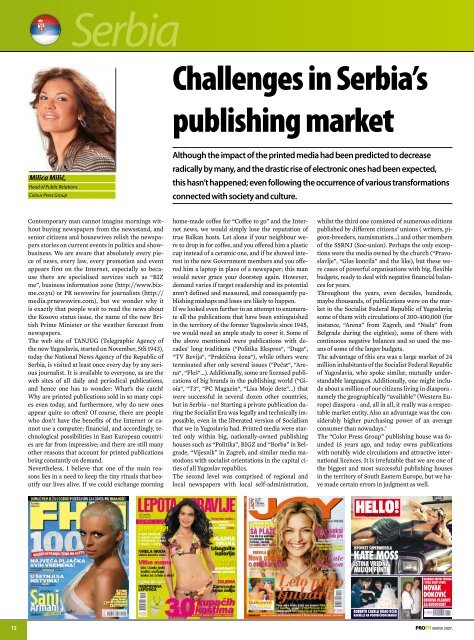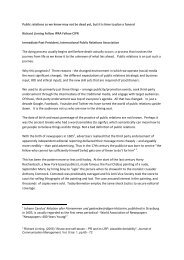CASE STUDY Pfizer's PR campaign „Openly about sex“ - PRO.PR
CASE STUDY Pfizer's PR campaign „Openly about sex“ - PRO.PR
CASE STUDY Pfizer's PR campaign „Openly about sex“ - PRO.PR
Create successful ePaper yourself
Turn your PDF publications into a flip-book with our unique Google optimized e-Paper software.
Milica Milić,<br />
Head of Public Relations<br />
Colour Press Group<br />
Serbia<br />
Contemporary man cannot imagine mornings without<br />
buying newspapers from the newsstand, and<br />
senior citizens and housewives relish the newspapers<br />
stories on current events in politics and showbusiness.<br />
We are aware that absolutely every piece<br />
of news, every law, every promotion and event<br />
appears first on the Internet, especially so because<br />
there are specialised services such as “BIZ<br />
me”, business information zone (http://www.bizme.co.yu)<br />
or <strong>PR</strong> newswire for journalists (http://<br />
media.prnewswire.com), but we wonder why it<br />
is exactly that people wait to read the news <strong>about</strong><br />
the Kosovo status issue, the name of the new British<br />
Prime Minister or the weather forecast from<br />
newspapers.<br />
The web site of TANJUG (Telegraphic Agency of<br />
the new Yugoslavia, started on November, 5th 1943),<br />
today the National News Agency of the Republic of<br />
Serbia, is visited at least once every day by any serious<br />
journalist. It is available to everyone, as are the<br />
web sites of all daily and periodical publications,<br />
and hence one has to wonder: What’s the catch?<br />
Why are printed publications sold in so many copies<br />
even today, and furthermore, why do new ones<br />
appear quite so often? Of course, there are people<br />
who don’t have the benefits of the Internet or cannot<br />
use a computer; financial, and accordingly, technological<br />
possibilities in East European countries<br />
are far from impressive; and there are still many<br />
other reasons that account for printed publications<br />
being constantly on demand.<br />
Nevertheless, I believe that one of the main reasons<br />
lies in a need to keep the tiny rituals that beautify<br />
our lives alive. If we could exchange morning<br />
Challenges in Serbia’s<br />
publishing market<br />
Although the impact of the printed media had been predicted to decrease<br />
radically by many, and the drastic rise of electronic ones had been expected,<br />
this hasn’t happened; even following the occurrence of various transformations<br />
connected with society and culture.<br />
home-made coffee for “Coffee to go” and the Internet<br />
news, we would simply lose the reputation of<br />
true Balkan hosts. Let alone if your neighbour were<br />
to drop in for coffee, and you offered him a plastic<br />
cup instead of a ceramic one, and if he showed interest<br />
in the new Government members and you offered<br />
him a laptop in place of a newspaper; this man<br />
would never grace your doorstep again. However,<br />
demand varies if target readership and its potential<br />
aren’t defined and measured, and consequently publishing<br />
mishaps and loses are likely to happen.<br />
If we looked even further in an attempt to enumerate<br />
all the publications that have been extinguished<br />
in the territory of the former Yugoslavia since 1945,<br />
we would need an ample study to cover it. Some of<br />
the above mentioned were publications with decades’<br />
long traditions (“Politika Ekspres“, “Duga“,<br />
“TV Revija“, “Praktična žena“), while others were<br />
terminated after only several issues (“Pečat“, “Arena“,<br />
“Fleš“...). Additionally, some are licensed publications<br />
of big brands in the publishing world (“Gioia“,<br />
“T3“, “PC Magazin“, “Lisa Moje dete“...) that<br />
were successful in several dozen other countries,<br />
but in Serbia - no! Starting a private publication during<br />
the Socialist Era was legally and technically impossible,<br />
even in the liberated version of Socialism<br />
that we in Yugoslavia had. Printed media were started<br />
only within big, nationally-owned publishing<br />
houses such as “Politika”, BIGZ and “Borba” in Belgrade,<br />
“Vijesnik” in Zagreb, and similar media mastodons<br />
with socialist orientations in the capital cities<br />
of all Yugoslav republics.<br />
The second level was comprised of regional and<br />
local newspapers with local self-administration,<br />
whilst the third one consisted of numerous editions<br />
published by different citizens’ unions ( writers, pigeon-breeders,<br />
numismatists…) and other members<br />
of the SSRNJ (Soc-union). Perhaps the only exceptions<br />
were the media owned by the church (“Pravoslavlje”,<br />
“Glas koncila” and the like), but these were<br />
cases of powerful organisations with big, flexible<br />
budgets, ready to deal with negative financial balances<br />
for years.<br />
Throughout the years, even decades, hundreds,<br />
maybe thousands, of publications were on the market<br />
in the Socialist Federal Republic of Yugoslavia;<br />
some of them with circulations of 300-400,000 (for<br />
instance, “Arena” from Zagreb, and “Nada” from<br />
Belgrade during the eighties), some of them with<br />
continuous negative balances and so used the means<br />
of some of the larger budgets.<br />
The advantage of this era was a large market of 24<br />
million inhabitants of the Socialist Federal Republic<br />
of Yugoslavia, who spoke similar, mutually understandable<br />
languages. Additionally, one might include<br />
<strong>about</strong> a million of our citizens living in diaspora -<br />
namely the geographically “available” (Western Europe)<br />
diaspora - and, all in all, it really was a respectable<br />
market entity. Also an advantage was the considerably<br />
higher purchasing power of an average<br />
consumer than nowadays.’<br />
The “Color Press Group” publishing house was founded<br />
15 years ago, and today owns publications<br />
with notably wide circulations and attractive international<br />
licences. It is irrefutable that we are one of<br />
the biggest and most successful publishing houses<br />
in the territory of South Eastern Europe, but we have<br />
made certain errors in judgment as well.<br />
BROJ 3 l 10-23. AVGUST 2007. l 80 DIN l CG 1 ¤ l 30 DEN<br />
IZLAZI SVAKOG DRUGOG PETKA<br />
ISPOVEST SUPERMODELA<br />
KATE MOSS<br />
ISTINA VREDNA<br />
MILION FUNTI<br />
ROBERTO CAVALLI UDAO KĆER<br />
RACHELLE NA PORODIČNOM IMANJU<br />
NAJBOLJI SRPSKI TENISER<br />
I TREĆI REKET SVETA<br />
NOVAK<br />
ĐOKOVIĆ<br />
OTKRIVA PLANOVE<br />
ZA BUDUĆNOST<br />
12 <strong>PR</strong>O<strong>PR</strong> winter 2007.<br />
1



